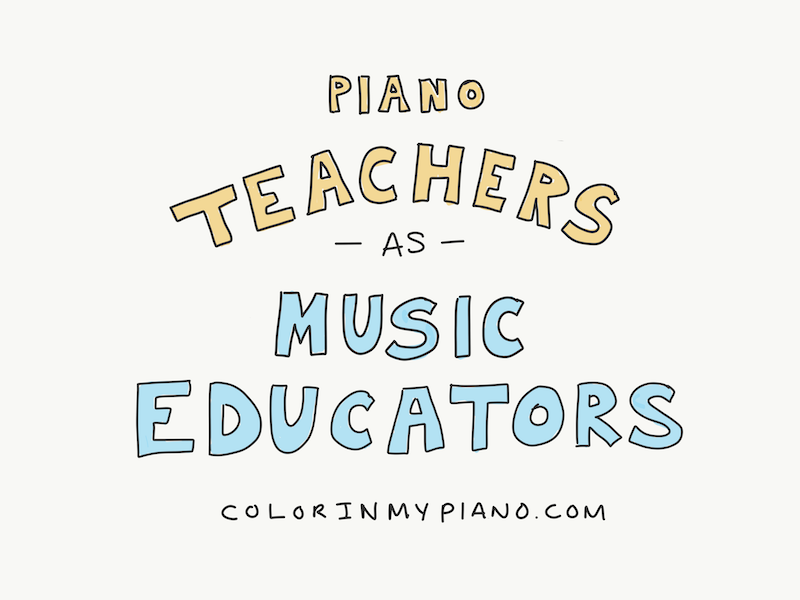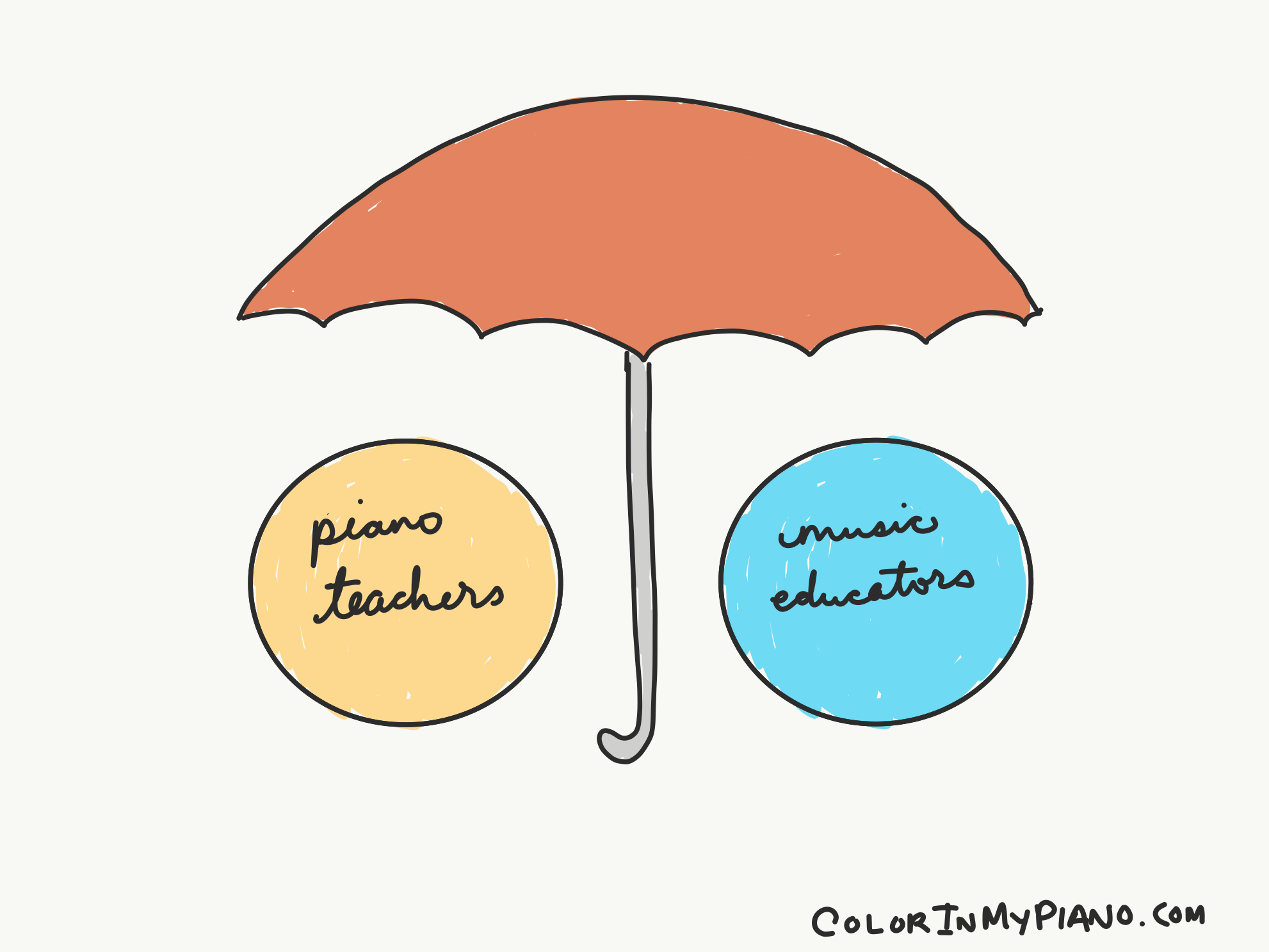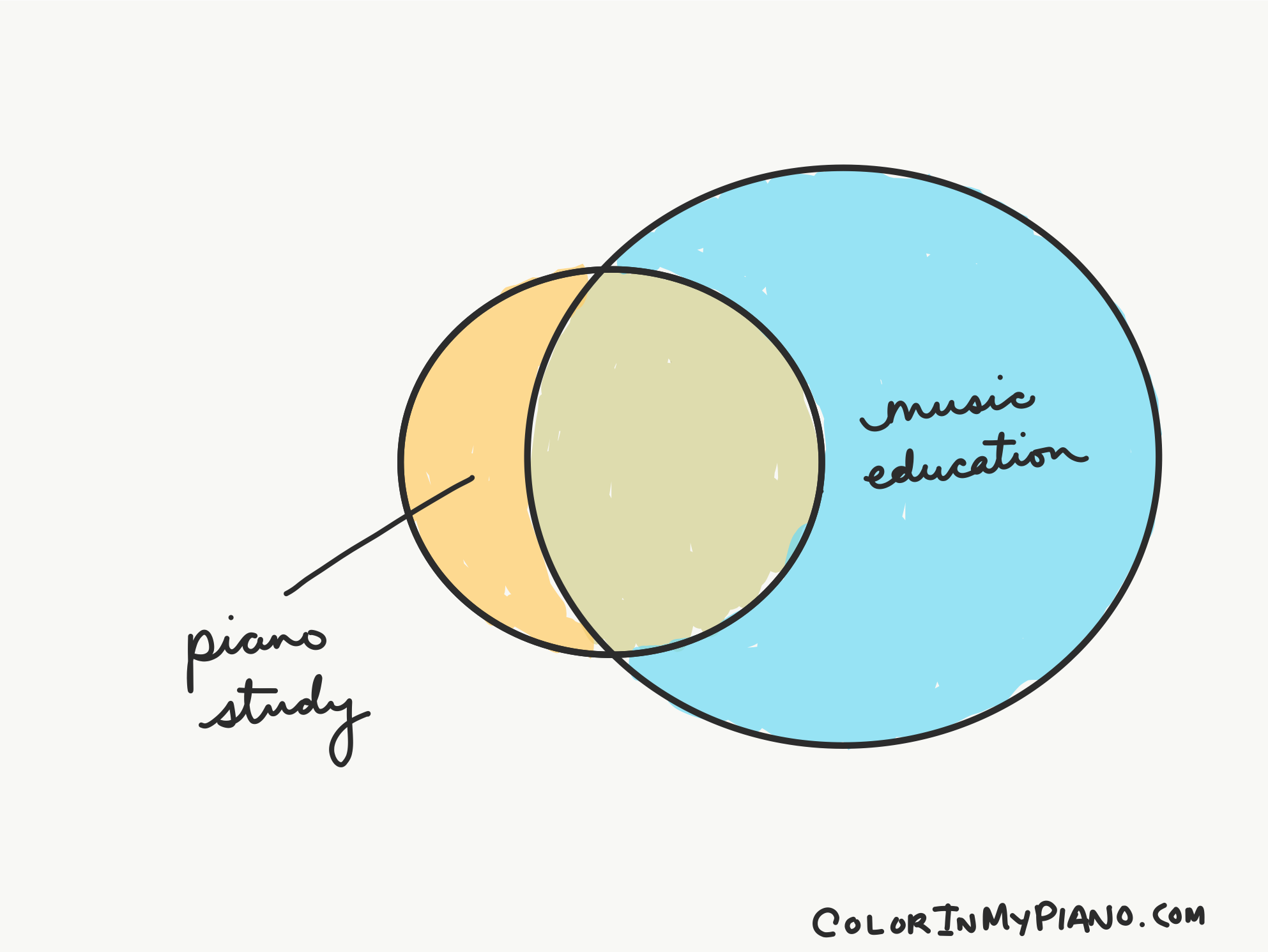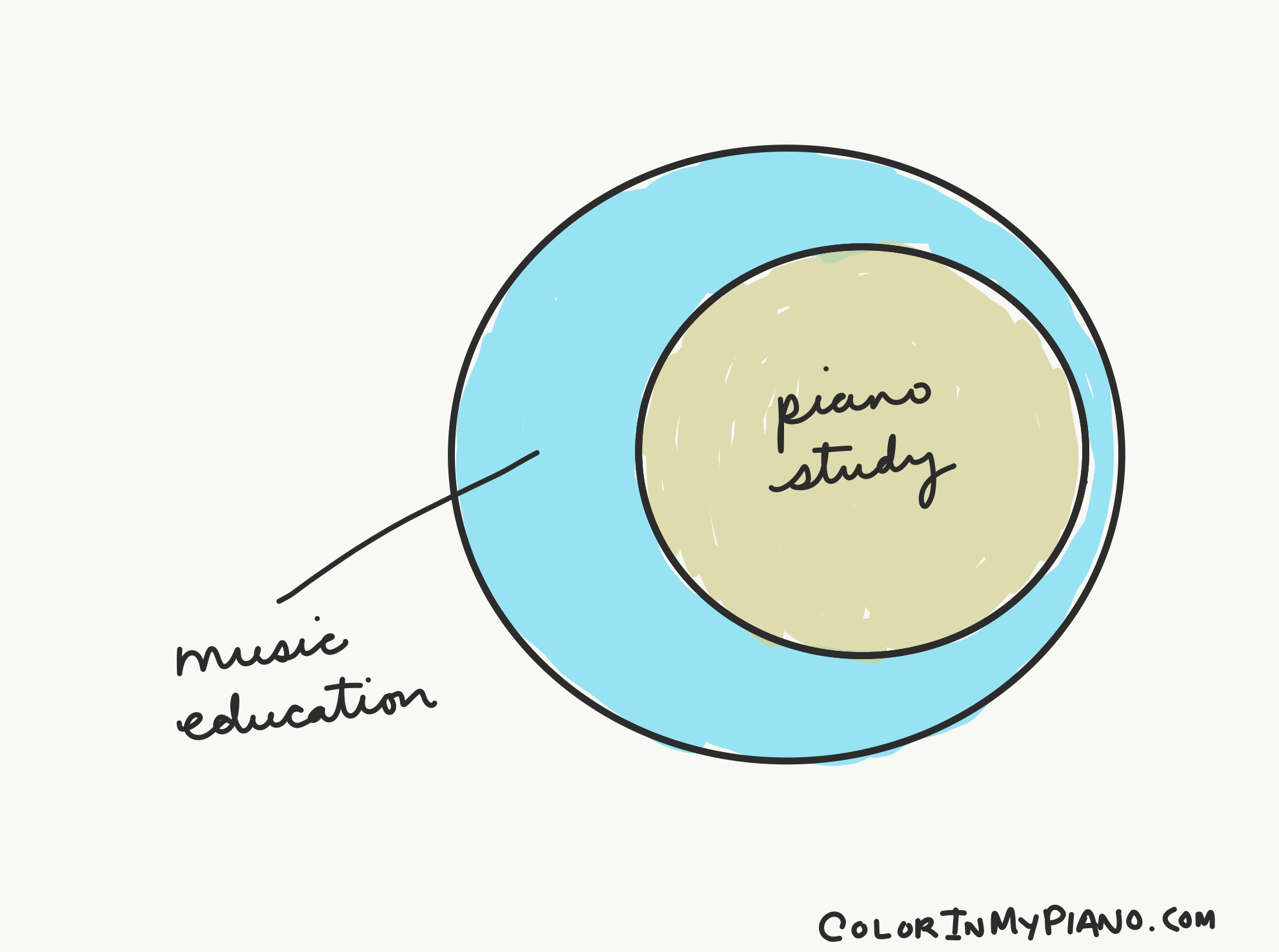
We’ve accomplished so much in the realm piano pedagogy over the decades. So many fine teachers, fine books, and fine pedagogical piano literature.
The music education community can tout similar advancements, and yet we piano teachers tend to know so little of them. We know little of the theories and recent research regarding music learning, and of the approaches music educators use in the school systems. Does anyone else find it odd?
There seems to be a certain degree of separation between the worlds of piano pedagogy and music education. We don’t interact much. We took separate courses while in college. We have separate professional organizations.
Do we piano pedagogues consider ourselves under the same umbrella as music educators?

Even better, do we perhaps consider piano study to have at least some degree of overlap with music education?

Or perhaps could we consider piano study to be more of a lens, whereby we see one’s music education as something that can be demonstrated through piano proficiency?

The more I study MLT (
Music Learning Theory), the more aware I am of the gulf we have tended to create each within ourselves — our piano teacher selves and our music educator selves.
We piano teachers do not always think about the underlying music education part.
As a whole, we piano teachers tend to focus our learning objectives on piano playing ability at the expense of addressing the student’s level of musical understanding.
We piano teachers might be good at the piano part. But are we really so good at the music part?
Do we truly understand how music is learned?
Don’t we have much in common with music educators? Wouldn’t it benefit us piano teachers to identify more deeply as music educators? Wouldn’t there be much to benefit from more interaction with the music education community?
I’m directing these questions to myself as much as to you.
What if we piano teachers truly embraced our role as music educators? And what if we spent time to together rethinking what it means to be a piano teacher?
It’s time for conversation. We have much to talk about.
• • •
Interested in learning more about getting at that underlying musical understanding? Stay tuned for future blog posts exploring what “audiation” is and how we can teach it.
Update: Read
What Is Audiation, Exactly?
Leave a comment: Do you feel that your own piano study experience involved mostly addressing piano playing skills, or also that underlying musical understanding?
Related:
Published by Joy Morin
Joy Morin, MM, is a teacher, pianist, composer, speaker, and writer of a blog at ColorInMyPiano.com. A devoted teacher and lifelong learner, she teaches students of all ages at her independent piano studio near Ann Arbor, Michigan. Joy is a frequent attendee and presenter at conferences and workshops, and enjoys connecting with fellow piano teachers through her blog and beyond.
View all posts by Joy Morin
 We’ve accomplished so much in the realm piano pedagogy over the decades. So many fine teachers, fine books, and fine pedagogical piano literature.
The music education community can tout similar advancements, and yet we piano teachers tend to know so little of them. We know little of the theories and recent research regarding music learning, and of the approaches music educators use in the school systems. Does anyone else find it odd?
There seems to be a certain degree of separation between the worlds of piano pedagogy and music education. We don’t interact much. We took separate courses while in college. We have separate professional organizations.
Do we piano pedagogues consider ourselves under the same umbrella as music educators?
We’ve accomplished so much in the realm piano pedagogy over the decades. So many fine teachers, fine books, and fine pedagogical piano literature.
The music education community can tout similar advancements, and yet we piano teachers tend to know so little of them. We know little of the theories and recent research regarding music learning, and of the approaches music educators use in the school systems. Does anyone else find it odd?
There seems to be a certain degree of separation between the worlds of piano pedagogy and music education. We don’t interact much. We took separate courses while in college. We have separate professional organizations.
Do we piano pedagogues consider ourselves under the same umbrella as music educators?
 Even better, do we perhaps consider piano study to have at least some degree of overlap with music education?
Even better, do we perhaps consider piano study to have at least some degree of overlap with music education?
 Or perhaps could we consider piano study to be more of a lens, whereby we see one’s music education as something that can be demonstrated through piano proficiency?
Or perhaps could we consider piano study to be more of a lens, whereby we see one’s music education as something that can be demonstrated through piano proficiency?
 The more I study MLT (Music Learning Theory), the more aware I am of the gulf we have tended to create each within ourselves — our piano teacher selves and our music educator selves.
We piano teachers do not always think about the underlying music education part. As a whole, we piano teachers tend to focus our learning objectives on piano playing ability at the expense of addressing the student’s level of musical understanding.
We piano teachers might be good at the piano part. But are we really so good at the music part? Do we truly understand how music is learned?
Don’t we have much in common with music educators? Wouldn’t it benefit us piano teachers to identify more deeply as music educators? Wouldn’t there be much to benefit from more interaction with the music education community?
I’m directing these questions to myself as much as to you.
What if we piano teachers truly embraced our role as music educators? And what if we spent time to together rethinking what it means to be a piano teacher?
It’s time for conversation. We have much to talk about.
• • •
Interested in learning more about getting at that underlying musical understanding? Stay tuned for future blog posts exploring what “audiation” is and how we can teach it. Update: Read What Is Audiation, Exactly?
Leave a comment: Do you feel that your own piano study experience involved mostly addressing piano playing skills, or also that underlying musical understanding?
Related:
The more I study MLT (Music Learning Theory), the more aware I am of the gulf we have tended to create each within ourselves — our piano teacher selves and our music educator selves.
We piano teachers do not always think about the underlying music education part. As a whole, we piano teachers tend to focus our learning objectives on piano playing ability at the expense of addressing the student’s level of musical understanding.
We piano teachers might be good at the piano part. But are we really so good at the music part? Do we truly understand how music is learned?
Don’t we have much in common with music educators? Wouldn’t it benefit us piano teachers to identify more deeply as music educators? Wouldn’t there be much to benefit from more interaction with the music education community?
I’m directing these questions to myself as much as to you.
What if we piano teachers truly embraced our role as music educators? And what if we spent time to together rethinking what it means to be a piano teacher?
It’s time for conversation. We have much to talk about.
• • •
Interested in learning more about getting at that underlying musical understanding? Stay tuned for future blog posts exploring what “audiation” is and how we can teach it. Update: Read What Is Audiation, Exactly?
Leave a comment: Do you feel that your own piano study experience involved mostly addressing piano playing skills, or also that underlying musical understanding?
Related:



Wow. Heavy question. I feel I’m in a unique position. I was a Music Education major in college with my main instrument being piano. I got my Masters in Piano Pedagogy. I spent 7 years as a band director. I’ve attended OMEA (Ohio Music Educators Association) conferences and Ohio Music Teachers Association conferences. Piano is my love, but education is my passion. I always view my job as being an educator.
Faye, that’s great that you have a background in both worlds. I bet it has served you well!
I also feel I’m in a unique position (and I actually use this to promote my studio!) – I have a Bachelor of Education and a Bachelor of Music and have spent 8 years teaching in the public school system. I feel my education experience has very much informed how I approach teaching the piano. I feel it’s hugely important to give my piano students as wholistic a music education as possible through not only piano technique and repertoire, but knowledge of music history, musicians, composition, etc. Thanks for the thoughtful post!
Well said, the gap is something i feel very passionate about but i have trouble expressing it correctly. You have done it perfectly, I am a passionate educator and love what music does for my students well being when it is taught as a wholistic subject.
Thank you, Lynda!
My students never know what they are going to get at their piano lessons! Of course, there’s the playing ability of the students, but I often connect this to other areas the students are learning, such as math, foreign language, reading, and any sports they are doing also. We discuss how these subjects are learned, and how that relates to learning piano. With certain songs or composers, I share what I know. Often that leads to discussions on the subject. Also, there are MANY times when we learn something in a piano lesson, the student has the same area covered in music class at school, or vice versa. Making these connections, I believe, helps the students to see the importance of learning piano, and how it connects to other areas of their lives.
This is a good article with good discussions! Thank you!
I agree that music should be more than learning notes and counting correctly! However, as teachers we are restricted by the time limit of the lesson and that is the hardest part; ensuring that the pupil is progressing with their piano playing, music theory and technical abilities and still trying to link up art, math and personal interests. It certainly can be done, but it is a fine balancing act.
Margaret, you raise up a good point here. It is one that I hope to address in future blog posts!
I just want to say thank you for your post on Music Learning Theory last spring. I am looking forward to anything else you have to share on the topic. I’ve been integrating the little that I have learned from Edwin Gordon on YouTube and the GIML.org page into my piano lessons. I can’t report the results yet since I haven’t been using this for more than a few months. However, this is what my music teacher used in elementary school. I think her working with us is the reason why my brothers and I can improvise with ease on our instruments.
Jenny, how wonderful that you experienced MLT during elementary school! I imagine this is a huge asset to you as a musician and now for you as a teacher who is interested in teaching in the same manner. Thanks for following my blog, and I hope you’ll share whatever insights you have on future posts about MLT!
Joy,
This is wonderful and a topic that I find myself talking about quite frequently with my teaching staff and fellow musicians. About four years ago I stepped into the position of running a multi instrument studio with nearly 250 students and this was the first time I worked closely with guitar teachers. Let me tell you, it is a completely different world! I myself teach piano and most band instruments and I feel that we all have as specific approach of teaching technique and classical repertoire that takes years to master. Yet these guitar teachers have students playing full songs and playing in rock bands in about a year. We have very different approaches and there are definitely pros and cons to both and I hope one day we will be able to merge these two together. I wish I could do the things that these students do but I was never trained in that way so it is very hard for me. It is definitely something that I am working on and I am helping my students with. I am on the board for our local MTNA chapter and lets just say I started ruffling some feathers this last year when I said things need to change! I could go on and on about this subject and I love that you posted about this!
Tara, I love your comment! We can learn so much by talking with music teachers of other instruments. I admire what you are doing!!